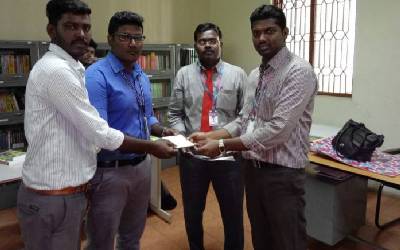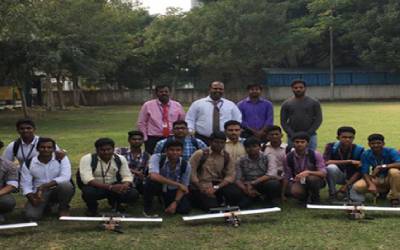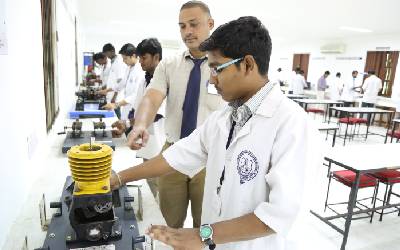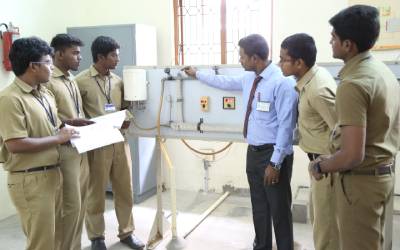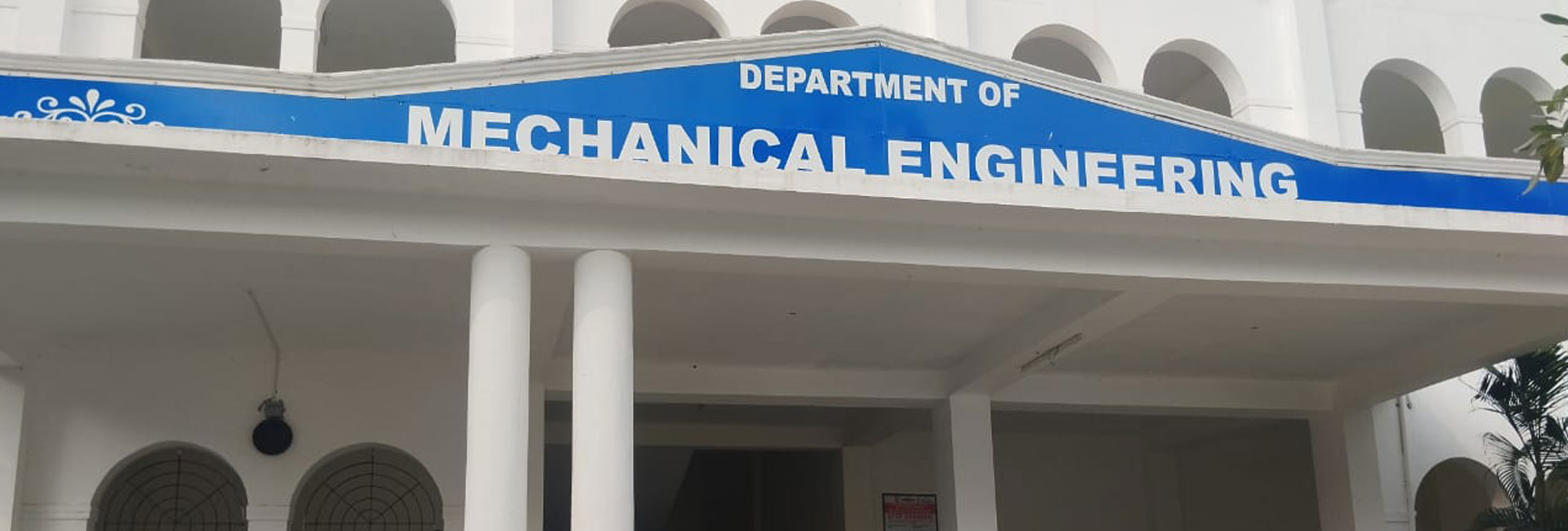
About the Department
Vision and Mission
PEO, PO'S, PSO'S
HOD Profile
Faculty List
Milestones
Professional Society
Clubs
Events
Question Bank
Newsletter and Magazines
Survey Forms
Gallery
Department Library
About the Department
Established in the year 2002, with 60 students, the Department of Mechanical Engineering has blossomed a full- fledged state of the art facility, a centre of excellence for Quality Education. The Department boasts of highly qualified and experienced professionals with wide exposure in all aspects of the subjects they handle. Many faculties possess/ pursue PhD and are involved in research and consultancy projects including friction stir processing, welding, advanced machining, nano composite materials, alternate fuels, additives, tribology and wear.
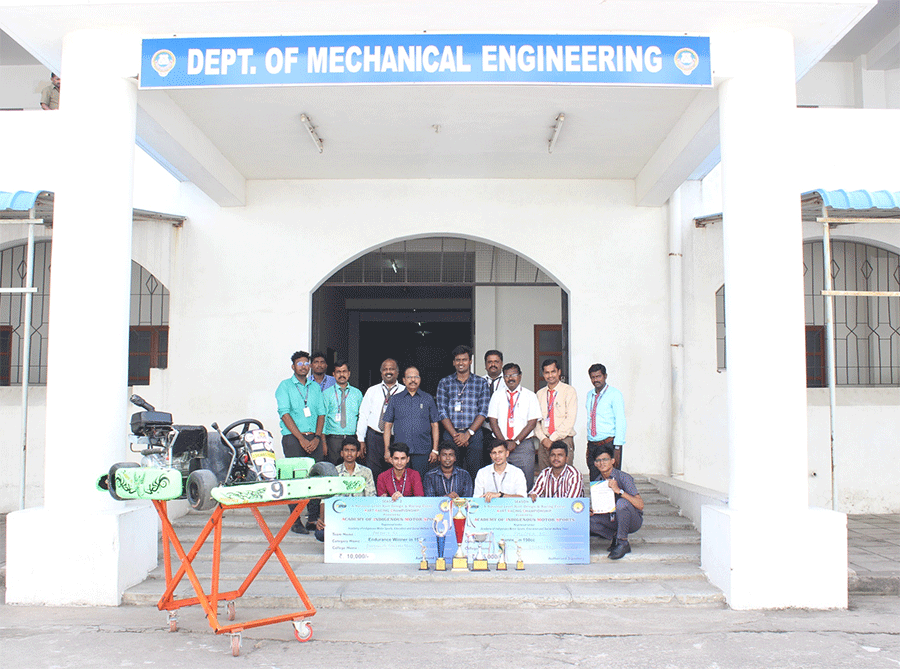
The students of the department have consistently performed well in academics with 3 gold medals and 125 University ranks so far. In addition to academics, the students career is enhanced through training in soft skills, personality development and placement training classes. With industrial and field experts, value-added programs such as CNC Machine Programming, CATIA, PIPING-SOFTWARE, CFD, SAP and GATE are regularly conducted. The major recruiters of the department include Yamaha, Ashok Leyland, Mahindra, F.L.Smidth, MRF, TCS, Infosys, Wipro, CTS. Many students also pursue higher studies at reputed national and international universities.
Vision and Mission

VISION
The Department of Mechanical Engineering will be globally recognized as a pioneer for its excellence in teaching and research in the field of Mechanical and allied Engineering disciplines.
MISSION
- M1: To provide world-class education and pioneering research opportunities, enabling students and faculty to contribute meaningfully to society through innovation and excellence.
- M2: To advance engineering and science by fostering technological innovation, academic excellence, and strong industry collaborations for impactful research and technology transfer.
- M3: To develop skilled, innovative, and entrepreneurial graduates who drive national and global sustainable development.
Programme Educational Objectives(PEO)
Programme Outcomes (PO)
PROGRAM SPECIFIC OUTCOMES (PSO’S):
Knowledge and Attitude Profile (WK)
HOD Profile
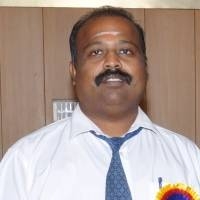
Dr. L. Karthikeyan, M.E, Ph.D
Professor and Head of the Department of Mechanical Engineering
He has more than 25 years of Teaching and Research experience in the field of Mechanical Engineering. He believes in the accessibility of science and technology to all addressing the specific needs of the community. He has completed his B.E at A.C. College of Engineering and Technology, Karaikudi and M.E., from P.S.G College of Technology. He has received his Ph.D. from College of Engineering Guindy Campus, Anna University, one among the top ten technical universities in India.
His research interests include Friction Stir Processing, Friction Stir Welding, Superplastic forming and Composite Machining. As a research scholar he has contributed substantially towards the successful completion of a major research project to tune of Rs. 9.91 Lakh funded by U.G.C, Delhi.
Faculty List
| S.No. | Name of the Faculty | Designation / Position |
| 1 |
Dr. L. Karthikeyan |
Professor & Head |
| 2 |
Dr. M. Mageswari |
Professor |
| 3 |
Dr. N. Nithyanandan |
Professor |
| 4 |
Dr. I. Paul Theophilus Rajakumar |
Professor |
| 5 |
Dr. A. Anbarasu |
Professor |
| 6 |
Dr. M. Puviyarasan |
Professor |
| 7 |
Mr. C. Karthikeyan |
Professor |
| 8 |
Dr. K. Thiruselvam |
Professor |
| 9 |
Dr. T. Mayavan |
Professor |
| 10 |
Dr. K.R. Padmavathi |
Professor |
| 11 |
Dr. R. Murugan |
Professor |
| 12 |
Dr. G. Rathinasabapathi |
Professor |
| 13 |
Dr. G. Senthil Kumar |
Professor |
| 14 |
Mr. K. Naveen |
Associate Professor |
| 15 |
Dr. N. Poyyamozhi |
Associate Professor |
| 16 |
Dr. K. Yesuraj |
Associate Professor |
| 17 |
Dr. I. John Solomon |
Assistant Professor |
| 18 |
Dr. J. Gunasekaran |
Assistant Professor |
| 19 |
Mr. J. Murugesan |
Assistant Professor |
| 20 |
Mr. R. Saravanan |
Assistant Professor |
| 21 |
Mr. S. Dhanasekar |
Assistant Professor |
| 22 |
Mr. S. Senthilkumar |
Assistant Professor |
| 23 |
Mr. P. Sakthikumar |
Assistant Professor |
| 24 |
Mr. B. Prabhu |
Assistant Professor |
| 25 |
Mr. P. Senthil Kumar |
Assistant Professor |
| 26 |
Mr. K. Ashokkumar |
Assistant Professor |
| 27 |
Mr. P. Iyyan Paramanandam |
Assistant Professor |
| 28 |
Mr. G. Gnanakumar |
Assistant Professor |
| 29 |
Mr. Amos Gamaleal David |
Assistant Professor |
| 30 |
Mr. V. Sharun |
Assistant Professor |
| 31 |
Mr. S. Santhosh Kumar |
Assistant Professor |
First Year Faculty List
| S.No. | Name of the Faculty | Designation / Position |
| 1 |
Mr. S. Louies Praveen |
Assistant Professor |
| 2 |
Mr. B. Bradley Bright |
Assistant Professor |
| 3 |
Mr. M. Selvakumar |
Assistant Professor |
| 4 |
Mr. K. Rajakarthikeyan |
Assistant Professor |
| 5 |
Mr. C. Paulprabakaran |
Assistant Professor |
Milestones
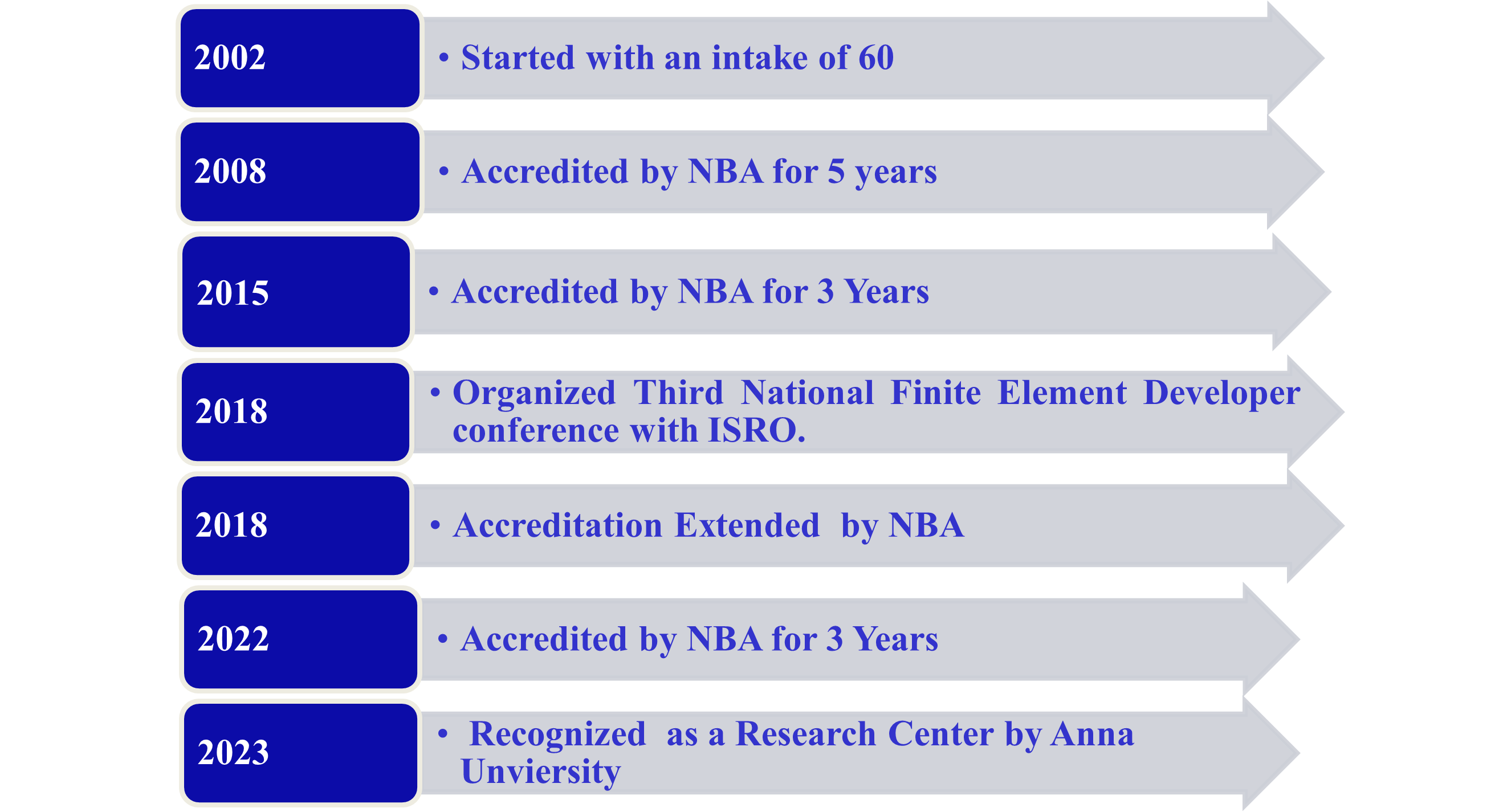
Events
FDP.STTP and ATAL FDP Attended Details
| S.No | YEAR |
NUMBER OF
|
|||
| FDP | STTP | WORKSHOP | TRAINING / WEBINAR | ||
| 1 | 2025-2026 | 10 | - | - | - |
| 2 | 2024-2025 | 16 | - | - | - |
| 3 | 2023-2024 | 42 | – | 12 | 3 |
| 4 | 2022-2023 | 12 | – | 4 | 4 |
| 5 | 2021-2022 | 15 | 1 | 2 | 1 |
| 6 | 2020-2021 | 37 | 7 | 6 | 1 |
| 7 | 2019-2020 | 40 | 9 | 1 | 23 |
Survey Forms
Question Bank – Academic Year 2025-26 (Odd Semester)
Gallery


















Mechanical Department Library Details
| Item | Details |
| Area | 171 Sq.m. |
| No. of Volumes | 2580 |
| No. of Titles | 456 |
| No. of Total Technical Journals(Scopus-National) | 17 (Access to Central Library-II) |
| No. of Reprint(Internationals Journals) | 07 (Access to Central Library-II) |
| No.of Computers | 01 |
| No. of E-Journals | 05(IEEE-ASPP/IEEE-POP/ELSIVIER-SCOPUS/ DELNET/EBSCOHOST |
| No.of E-Books | 01 (MGH) |

E-Resources(E-journals / E-Books)
Click Here

Remote Access Resources
Click
Here

